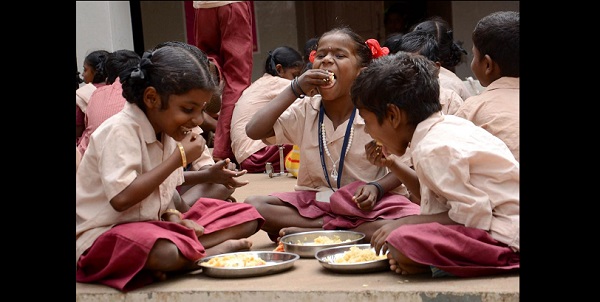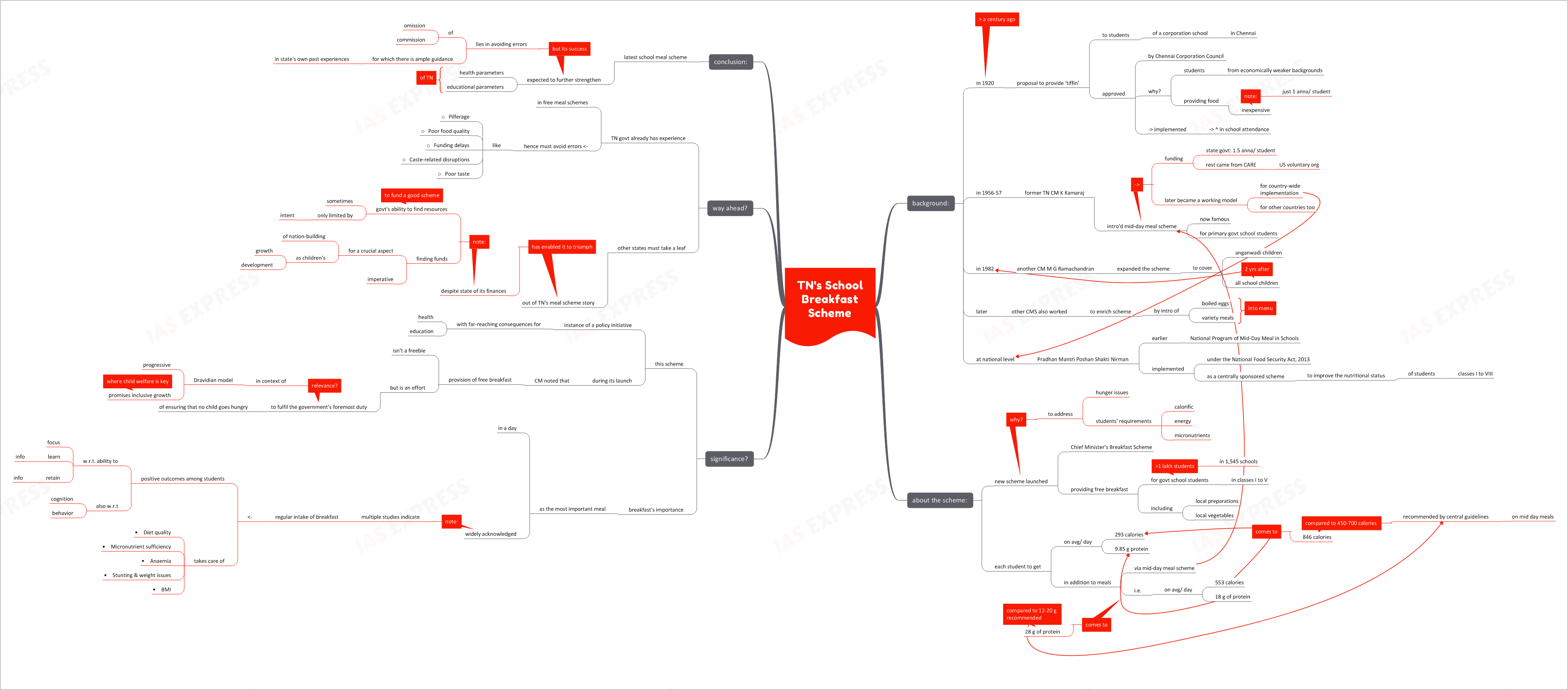TN’s School Breakfast Scheme

This topic of “TN’s School Breakfast Scheme” is important from the perspective of the UPSC IAS Examination, which falls under General Studies Portion.
Background:
- Over a century ago, in 1920, the Chennai Corporation Council approved a proposal to provide ‘tiffin’ to students of a corporation school in Chennai.
- The rationale was that the students were from economically weaker backgrounds and that providing food wasn’t an expensive affair (at just 1 anna/ student).
- Following its implementation, the school recorded an increase in attendance.
- Later, in 1956-57, former Tamil Nadu Chief Minister K Kamaraj introduced the now famous Mid-Day Meal Scheme for government primary schools.
- Towards this scheme, the state government contributed 1.5 anna/ student while the rest of the cost was met with the help of CARE, a US voluntary organization.
- Over the years, this scheme became the working model for country-wide implementation and for other countries as well.
- In 1982, another CM M.G. Ramachandran expanded the scheme to cover the anganwadi children too. 2 years later, all school children were covered by the scheme.
- Later year CMs had also worked to enrich the scheme further by introducing boiled eggs and variety meals into the menu.
- At the national level, the Pradhan Mantri Poshan Shakti Nirman (earlier National Program of Mid-Day Meal in Schools) is implemented, under the National Food Security Act, 2013, as a centrally sponsored scheme. It seeks to improve the nutritional status of students in classes I to VIII.
About the Scheme:
- Recently, the TN state government launched the ‘Chief Minister’s Breakfast Scheme’ for government school students of classes I to V.
- This scheme is to provide free breakfast to over 1 lakh students studying in 1,545 schools across the state.
- Each student is to receive an average of 293 calories and 9.85 g protein per day. Apart from this, the students are already receiving nutrition via mid-day meal scheme:
- The mid-day meal scheme provides an average of 553 calories and 18 g of protein.
- This brings the total to 846 calories and nearly 28 g of protein/ day for the students. Comparatively, the central mid-day meal guidelines prescribe 450-700 calories/ day/ child and 12-20 g protein/ day.
- The scheme is to provide a diet of local preparations and vegetables to
- Address hunger issues
- Address the children’s requirement- calorific, energy and micronutrient
Why is this significant?
- This scheme is an instance of a policy initiative that could have far-reaching consequences for students’ health and education.
- At the launch, the CM noted that provision of free breakfast isn’t a freebie, but an effort to fulfil the government’s foremost duty of ensuring that no child goes hungry. This stance hold relevance in context of the progressive Dravidian model that promises inclusive growth– a key element of which is children’s welfare.
- The importance of breakfast as the most important meal in a day is widely acknowledged.
- Across the world, multiple studies indicate that regular intake of breakfast gives positive outcomes among students, in terms of their ability to focus, learn and retain information, cognition and behaviour.
- Regular breakfast also takes care of:
- Diet quality
- Micronutrient sufficiency
- Anaemia
- Stunting & weight issues
- BMI
What is the way ahead?
- The TN government already has rich experience in dealing with free meal schemes over the decades. Hence, it must avoid errors like:
- Pilferage
- Poor food quality
- Funding delays
- Caste-related disruptions
- Poor taste
- Other states could take a leaf out of TN’s meal scheme story which has enabled it to triumph despite the state of its finances. Sometimes, a government’s ability to find resources for a good scheme is limited only by its intent.
- Finding funds for a crucial aspect of nation-building– i.e. children’s growth and development– is imperative.
Conclusion:
The latest school meal scheme is expected to further strengthen the health and educational parameters of the southern state. However, its success lies in taking care to avoid errors of commission and omission- for which ample guidance is available in the state government’s past experiences itself.
Practice Question for Mains:
Trace the evolution of free meal schemes in Tamil Nadu. Discuss the significance of the state’s latest free school breakfast scheme. (250 words)


